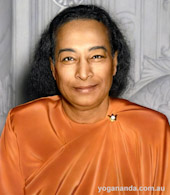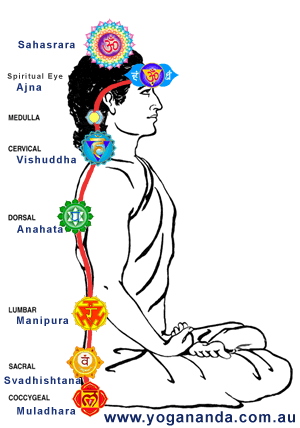LOVE
(Excerpts from How to Cultivate Divine Love By Paramahansa Yogananda)
Real Meaning of Love
 The world as a whole has forgotten the real meaning of the word love. Love has been so abused and crucified by man that very few people know what true love is. Just as oil is present in every part of the olive, so love permeates every part of creation. But to define love is very difficult, for the same reason that words cannot fully describe the flavor of an orange. You have to taste the fruit to know its flavor. So with love. All of you have tasted love in some form in your hearts; therefore you know a little about what it is. But you have not understood how to develop love, how to purify and expand it into divine love. A spark of this divine love exists in most hearts in the beginning of life, but is usually lost, because man does not know how to cultivate it. (…)
The world as a whole has forgotten the real meaning of the word love. Love has been so abused and crucified by man that very few people know what true love is. Just as oil is present in every part of the olive, so love permeates every part of creation. But to define love is very difficult, for the same reason that words cannot fully describe the flavor of an orange. You have to taste the fruit to know its flavor. So with love. All of you have tasted love in some form in your hearts; therefore you know a little about what it is. But you have not understood how to develop love, how to purify and expand it into divine love. A spark of this divine love exists in most hearts in the beginning of life, but is usually lost, because man does not know how to cultivate it. (…)
Think deeply about what I am telling you. The satisfaction of love is not in the feeling itself, but in the joy that feeling brings. Love gives joy. We love love because it gives us such intoxicating happiness. So love is not the ultimate; the ultimate is bliss. God is Sat-Chit-Ananda, ever-existing, ever-conscious, ever-new Bliss. We, as soul, are individualized Sat-Chit-Ananda. "From Joy we have come, in Joy we live and have our being, and in that sacred Joy we will one day melt again."[Taittiriya Upanishad 3-6-1] All the divine emotions—love, compassion, courage, self-sacrifice, humility—would be meaningless without joy. Joy means exhilaration, an expression of the ultimate Bliss.
 Man's experience of joy originates in the brain, in the subtle center of God-consciousness that the yogis call the sahasrara, or thousand-petaled lotus. Yet the actual feeling of joy is experienced not in the head but in the heart. From the divine seat of God-consciousness in the brain, joy descends into the heart center, and manifests there. [* The anahata chakra, the subtle dorsal center; the seat of feeling; center of control of vayu, the vibratory air element, a manifestation of the creative Aum vibration. Man's life and consciousness are perpetuated by the power and activity within the "tree of life," the trunk of which is seven subtle centers located in the spine and brain. From these centers comes the power for all man's physiological and psychological functions and abilities. Owing to their common center of origin, some spiritual and psychological experiences are intertwined with physiological processes. For example, there is a definite connection between the physiological function of the heart and the subtle spiritual center of feeling in the heart. Working together, they express the great emotion of love, both human and divine.]
Man's experience of joy originates in the brain, in the subtle center of God-consciousness that the yogis call the sahasrara, or thousand-petaled lotus. Yet the actual feeling of joy is experienced not in the head but in the heart. From the divine seat of God-consciousness in the brain, joy descends into the heart center, and manifests there. [* The anahata chakra, the subtle dorsal center; the seat of feeling; center of control of vayu, the vibratory air element, a manifestation of the creative Aum vibration. Man's life and consciousness are perpetuated by the power and activity within the "tree of life," the trunk of which is seven subtle centers located in the spine and brain. From these centers comes the power for all man's physiological and psychological functions and abilities. Owing to their common center of origin, some spiritual and psychological experiences are intertwined with physiological processes. For example, there is a definite connection between the physiological function of the heart and the subtle spiritual center of feeling in the heart. Working together, they express the great emotion of love, both human and divine.]
That joy comes from God's bliss—the essential and ultimate attribute of Spirit.
Though joy may be born in conjunction with certain outer conditions, it is not subject to conditions; it often manifests without any material cause. Sometimes you wake up in the morning "walking on air" with joy, and you don't know why. And when you sit in the silence of deep meditation, joy bubbles up from within, roused by no outer stimulus. The joy of meditation is overwhelming. Those who have not gone into the silence of true meditation do not know what real joy is.
We feel much happiness in the satisfaction of a desire; but in youth we often feel in the heart a sudden happiness that comes as if from nowhere. Joy expresses itself under certain conditions, but it is not created by those conditions. Thus, when someone receives a thousand dollars and exclaims, "Oh, how happy I am!" the condition of having received a thousand dollars has merely served as a pickax, releasing a fountain of joy from the hidden reservoir of bliss within. So, in human experience, certain events are usually required to bring forth joy, but the joy itself is the perennial native state of the soul. Love also is native to the soul, but love is secondary to joy; there could be no love without joy. Can you think of love without joy? No. Joy attends love. When we speak of the misery of unrequited love, we are talking of an unfulfilled longing. The actual experience of love is always accompanied by joy.
The Universal Nature of Love
In the universal sense, love is the divine power of attraction in creation that harmonizes, unites, binds together. It is opposed by the force of repulsion, which is the outgoing cosmic energy that materializes creation from the cosmic consciousness of God. Repulsion keeps all forms in the manifested state through maya, the power of delusion that divides, differentiates, and disharmonizes. The attractive force of love counteracts cosmic repulsion to harmonize all creation and ultimately draw it back to God. Those who live in tune with the attractive force of love; achieve harmony with nature and their fellow beings, and are attracted to blissful reunion with God.
In this world, love presupposes duality; it springs from a mutual exchange or suggestion of feeling between two or more forms. Even animals express a certain type of love for one another and for their offspring. In many species, when one mate dies, the other usually succumbs soon after. But this love in animals is instinctive; they are not responsible for their love. Human beings, however, have a great deal of conscious self-determination in their exchange of love with others.
In man, love expresses itself in various ways. We find love between man and wife, parent and child, brother and sister, friend and friend, master and servant, guru and disciple—as with Jesus and his disciples and the great masters of India and their chelas—and between the devotee and God, soul and Spirit.
Love is a universal emotion; its expressions are distinguished by the nature of the thought through which it moves. Hence, when love passes through the heart of the father, fatherly consciousness translates it into fatherly love. When it passes through the heart of the mother, motherly consciousness translates it into motherly love. When it passes through the heart of the lover, the consciousness of the lover gives that universal love still another quality. It is not the physical instrument, but the consciousness through which the love moves that determines the quality of love expressed. Thus a father may express motherly love, a mother may express friendly love, a lover may express divine love.
Every reflection of love comes from the one Cosmic Love, but when expressed as human love in its various forms, there is always some taint in it. The mother doesn't know why she loves the child; the child knows not why he loves the mother. They do not know whence comes this love they feel for one another. It is the manifestation in them of God's love; and when it is pure and unselfish, it reflects His divine love. Thus, by investigating human love, we can learn something of divine love, for in human love we have glimpses of that love of God's.
Fatherly Love is Based on Reason
Fatherly love is wisdom-born, and based on reason. Uppermost in the father's consciousness is the thought, "This is my child to take care of and protect." He does this unselfishly, expressing his love by doing things to please and instruct the child as well as providing for its needs. But fatherly love is partly instinctive, as are all forms of familial love; the father cannot help but love the child.
Motherly Love is Based on Feeling
It is based on feeling, rather than on reason. True mother love is unconditional. We can say that in many ways it is more spiritual and therefore greater than most human expressions of love. God implanted in the heart of the mother a love for the child that is unconditional, regardless of the child's merit or behavior. Even if the child in later life becomes a murderer, the mother's love remains steady, unchanged; whereas the father may be more impatient and less inclined to forgive. The unconditional love of the mother is perhaps the human love closest to the perfection of God's love. The true mother forgives her son even when no one else will. That kind of love exemplifies God's love; He forgives His children no matter what sins they have committed. Now who could have placed this love in the mother's heart, save God? In true maternal love God gives us distinct proof that He loves us unconditionally, no matter how wicked we are, or how many times we have sinned. (…)
That is the relationship to have with God, for the love of the Mother is the all-forgiving love of the Divine.